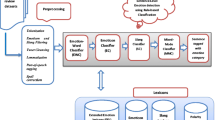Abstract
A sentimental sentence usually contains three important components: first, the core expression component; second, the modifier component; and third, the regulatory component. The three components do not exist independently; rather, they interactively form a sentimental sentence. Therefore, in text-based sentiment analysis, while the core expression components are considered the essence of a sentence, all three components need to be considered in a layered structure. The semantics of “可[KE]” in text exhibits a high degree of variation, increasing the difficulty in text-based sentimental analysis. This paper focuses on the screening, classification, and analysis of sentimental sentences involving “可” within the framework of text-based affective analysis. We extracted models and patterns in affective expressions in sentences involving “可”. The purpose of this work is to extract the common usage and patterns of “可” in affective expressions, which, in turn, will be helpful for sentimental analysis.
Access this chapter
Tax calculation will be finalised at checkout
Purchases are for personal use only
Similar content being viewed by others
References
Taboada, M., Brooke, J., Tofiloski, M., Voll, K., Stede, M.: Lexicon-based methods for sentiment analysis. Comput. Linguist. 37(2), 267–307 (2011)
Cambria, E.: Affective computing and sentiment analysis. IEEE Intell. Syst. 31(2), 102–107 (2016)
Zhang, S., Wei, Z., Wang, Y., Liao, T.: Sentiment analysis of Chinese micro-blog text based on extended sentiment dictionary. Future Gener. Comput. Syst. 81, 395–403 (2018)
Abdi, A., Shamsuddin, S.M., Hasan, S., Piran, J.: Deep learning-based sentiment classification of evaluative text based on multi-feature fusion. Inf. Process. Manage. 56(4), 1245–1259 (2019)
Tsai, A.C.-R., Wu, C.-E., Tsai, R.T.-H., Hsu, J.Y.-J.: Building a concept-level sentiment dictionary based on commonsense knowledge. IEEE Intell. Syst. 28(2), 22–30 (2013)
Xu, G., Yu, Z., Yao, H., Li, F., Meng, Y., Wu, X.: Chinese text sentiment analysis based on extended sentiment dictionary. IEEE Access 7, 43749–43762 (2019)
Peng, H., Cambria, E., Hussain, A.: A review of sentiment analysis research in Chinese language. Cogn. Comput. 9(4), 423–435 (2017)
Kaur, H., Mangat, V., Krail, N.: Dictionary based sentiment analysis of hinglish text. Int. J. Adv. Res. Comput. Sci. 8(5) (2017)
Miyakawa, S., Saitoh, F., Ishizu, S.: A quality table-based method for sentiment expression word identification in Japanese. In: International Conference of Design, User Experience, and Usability. Springer (2017). https://doi.org/10.1007/978-3-319-58637-3_4
Park, S.-M., Na, C.-W., Choi, M.-S., Lee, D.-H., On, B.-W.: KNU Korean sentiment lexicon: Bi-LSTM-based method for building a Korean sentiment lexicon. J. Intell. Inform. Syst. 24(4), 219–240 (2018)
Moreno-Sandoval, L.G., et al.: CSL: a combined Spanish Lexicon-resource for polarity classification and sentiment analysis. In: International Conference on Enterprise Information Systems. SCITEPRESS (2017)
Rosa, R.L., Schwartz, G.M., Ruggiero, W.V., Rodríguez, D.Z.: A knowledge-based recommendation system that includes sentiment analysis and deep learning. IEEE Trans. Industr. Inf. 15(4), 2124–2135 (2018)
Chen, L.-C., Lee, C.-M., Chen, M.-Y.: Exploration of social media for sentiment analysis using deep learning. Soft. Comput. 24(11), 8187–8197 (2019). https://doi.org/10.1007/s00500-019-04402-8
Yang, P., Chen, Y.: A survey on sentiment analysis by using machine learning methods. In: 2017 IEEE 2nd Information Technology, Networking, Electronic and Automation Control Conference (ITNEC). IEEE (2017)
Song, C., Wang, X.-K., Cheng, P.-F., Wang, J.-Q., Li, L.: SACPC: a framework based on probabilistic linguistic terms for short text sentiment analysis. Knowl.-Based Syst. 105572 (2020)
Poria, S., Cambria, E., Gelbukh, A., Bisio, F., Hussain, A.: Sentiment data flow analysis by means of dynamic linguistic patterns. IEEE Comput. Intell. Mag. 10(4), 26–36 (2015)
Ding, X., Liu, B.: The utility of linguistic rules in opinion mining. In: Proceedings of the 30th annual international ACM SIGIR conference on Research and development in information retrieval (2007)
Li, F., Han, C., Huang, M., Zhu, X., Xia, Y., Zhang, S., Yu, H.: Structure-aware review mining and summarization. In Proceedings of the 23rd International Conference on Computational Linguistics (Coling 2010) (2010)
Wang, Z.: Expressional functions of modal verb in sentence. J. Liaoning Inst. Technol. 1 (2002)
Givón, T.: Functionalism and grammar. John Benjamins Publishing, Amsterdam (1995)
Gisborne, N.: Dynamic modality. SKASE J. Theor. Linguist. 4(2), 44–61 (2007)
Acknowledgments
The work of T. Naren was supported by Beijing Municipal Fellowship Award 2018PC03.
Author information
Authors and Affiliations
Corresponding author
Editor information
Editors and Affiliations
Rights and permissions
Copyright information
© 2021 Springer Nature Switzerland AG
About this paper
Cite this paper
Naren, T., Xu, X. (2021). Affective Semantics and Regulatory Modes of the Word “可” in Text-Based Sentiment Analysis. In: Liu, M., Kit, C., Su, Q. (eds) Chinese Lexical Semantics. CLSW 2020. Lecture Notes in Computer Science(), vol 12278. Springer, Cham. https://doi.org/10.1007/978-3-030-81197-6_25
Download citation
DOI: https://doi.org/10.1007/978-3-030-81197-6_25
Published:
Publisher Name: Springer, Cham
Print ISBN: 978-3-030-81196-9
Online ISBN: 978-3-030-81197-6
eBook Packages: Computer ScienceComputer Science (R0)




